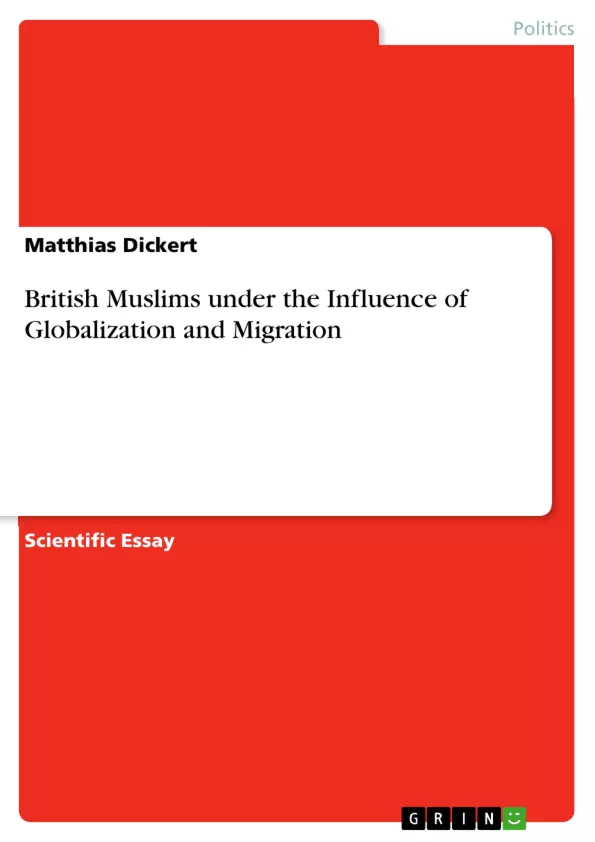Despite its obvious importance, the relationship between globalization, migration and religion is a fairly neglected phenomenon in scientific research.
The religion of Islam is amongst the world religions to be hit the hardest by globalization processes. At the same time, more radical forms of Islam, in the shape of fundamentalism, seem to gain more and more influence in the West as well as in the Arabic world.
In Great Britain, migration movements after World War II proved that Muslims are still not integrated in British society. Most Muslims still ask themselves the question 'Are we Muslims in Britain or are we British Muslims?'
This dilemma increased after 9/11 and 2005 and opened the doors for the radical ideas simply because Islam serves well to provide identity in a diaspora situation.
This essay tries to show how globalization, migration and Islam are interwoven and in how far British society is threatened by fundamentalism which still hinders a dialogue on both sides.
Inhaltsverzeichnis (Table of Contents)
- Preface
- Globalization, Migration and the Function of Religion
- Immigration, Politics and Religion in Past and Present
- Modern British Society under the Focus of Islam
- Conclusion: Muslims in the Focus of Race Relations
- Outlook
Zielsetzung und Themenschwerpunkte (Objectives and Key Themes)
This work aims to explore the complex relationship between globalization, migration, and the role of religion, particularly Islam, in modern British society. It delves into the effects of these interconnected forces on British Muslims and the broader social, political, and cultural landscape.
- The impact of globalization and migration on religion, especially Islam
- The interplay between immigration, politics, and religion in historical and contemporary contexts
- The experience of Muslims in modern British society and the challenges of integration
- The evolving discourse on race relations and its connection to the experiences of Muslims
- The literary reflections of these themes in contemporary novels
Zusammenfassung der Kapitel (Chapter Summaries)
- Preface: This introductory chapter sets the stage by highlighting the profound impact of globalization on various aspects of human life, including religion. It emphasizes the challenge faced by religions, particularly Islam, in navigating the dynamic forces of globalization and migration.
- Globalization, Migration and the Function of Religion: This chapter delves into the interconnectedness of globalization and migration, exploring the historical and contemporary dimensions of these phenomena. It examines the role of migration in shaping social, economic, and religious landscapes, with a particular focus on the impact of Muslim migration on British society.
Schlüsselwörter (Keywords)
The key concepts explored in this work include globalization, migration, Islam, British society, integration, race relations, multiculturalism, contemporary literature, and the relationship between religion, politics, and social change.
Frequently Asked Questions
How does globalization affect the religion of Islam?
Islam is one of the world religions most significantly impacted by globalization, leading to challenges in maintaining identity and sometimes the rise of radical fundamentalism.
What is the central dilemma for British Muslims?
Many Muslims in the UK struggle with the question: "Are we Muslims in Britain or are we British Muslims?", reflecting a conflict between religious and national identity.
How did migration after WWII impact British society?
Post-WWII migration movements showed that integration remains a complex issue, with many Muslim communities remaining socially distinct from the broader British society.
What role did 9/11 and the 2005 bombings play in race relations?
These events increased the identity dilemma for Muslims and opened doors for radical ideas, while simultaneously hindering dialogue between different parts of society.
How is Islam used in a diaspora situation?
In diaspora, Islam often serves as a strong provider of identity, helping individuals maintain a sense of belonging in a foreign environment.
- Citation du texte
- Matthias Dickert (Auteur), 2014, British Muslims under the Influence of Globalization and Migration, Munich, GRIN Verlag, https://www.grin.com/document/274121



